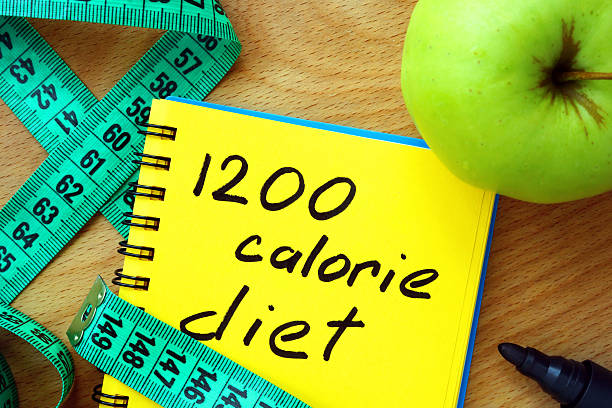
The calorie deficit diet has become increasingly popular in recent years as a way to shed unwanted pounds. The concept is simple: consume fewer calories than you burn throughout the day in order to create a calorie deficit. This deficit forces your body to burn fat stores in order to meet its energy needs, resulting in weight loss. But is this diet a true weight loss solution or just another passing fad? In this blog post, we’ll discuss the pros and cons of the calorie deficit diet and determine whether it’s an effective weight loss method.
What is a calorie deficit diet?
A calorie deficit diet is a weight loss strategy that involves consuming fewer calories than your body needs in order to create a calorie deficit. The basic principle is simple: if you burn more calories than you consume, your body will be forced to tap into its fat stores for energy, resulting in weight loss. This concept is rooted in the basic principle of thermodynamics: energy cannot be created or destroyed, only transferred. In the case of weight loss, the energy (calories) stored in your fat cells is transferred and used by your body when you consume fewer calories than you burn.
To achieve a calorie deficit, you can either reduce your calorie intake by eating less or increase your calorie expenditure through physical activity. Many people choose to combine both approaches to create a larger calorie deficit and maximize weight loss.
It’s important to note that not all calories are created equal. While a calorie deficit diet focuses on the quantity of calories consumed, it’s also important to consider the quality of those calories. Nutrient-dense foods, such as fruits, vegetables, lean proteins, and whole grains, provide your body with the essential vitamins, minerals, and antioxidants it needs to function optimally while still supporting weight loss.

How does a calorie deficit diet work for weight loss?
A calorie deficit diet works for weight loss by creating an energy imbalance in your body. When you consume fewer calories than you burn, your body is forced to tap into its fat stores to make up for the energy shortfall. This leads to weight loss over time.
To achieve a calorie deficit, you can either reduce your calorie intake through portion control and making healthier food choices, or increase your calorie expenditure through physical activity. Many people find that a combination of both approaches yields the best results.
The science behind a calorie deficit diet is rooted in the laws of thermodynamics. When you consume fewer calories than your body needs, it must rely on stored fat for energy. This is because energy cannot be created or destroyed, only transferred. By creating a calorie deficit, you essentially create a situation where your body needs to burn fat for fuel.

The science behind calorie deficit diets
The science behind calorie deficit diets is based on the principle of thermodynamics. According to this principle, energy cannot be created or destroyed, only transferred. When it comes to weight loss, this means that in order to burn fat and lose weight, you need to create a calorie deficit.
A calorie deficit occurs when you consume fewer calories than your body needs to maintain its current weight. This deficit forces your body to tap into its fat stores for energy, leading to weight loss.
When you consume fewer calories than your body needs, it must find an alternative fuel source. Since your body stores excess calories as fat, it turns to these fat stores for energy when there is a calorie deficit. This is why a calorie deficit diet can be an effective weight loss method.
However, it’s important to note that the rate of weight loss can vary from person to person. Factors such as metabolism, genetics, and hormonal balance can influence how quickly or slowly you lose weight on a calorie deficit diet.
In addition, the quality of the calories you consume also matters. While a calorie deficit diet focuses on the quantity of calories consumed, it’s still important to prioritize nutrient-dense foods that provide your body with essential vitamins and minerals.

Pros of a calorie deficit diet
The calorie deficit diet offers several advantages when it comes to weight loss. Here are some of the pros of following this approach:
- Effective for weight loss: Creating a calorie deficit is a tried-and-true method for shedding pounds. By consistently consuming fewer calories than you burn, your body is forced to tap into its fat stores for energy. This can result in steady, sustainable weight loss over time.
- Flexibility: The calorie deficit diet doesn’t restrict specific food groups or require you to follow strict meal plans. Instead, it focuses on the overall quantity of calories consumed. This flexibility allows you to choose foods that you enjoy and that fit your individual preferences, making it easier to stick to the diet long-term.
- Customizable: One of the greatest advantages of the calorie deficit diet is its adaptability. It can be tailored to suit your unique needs and lifestyle. You can adjust your calorie intake based on factors such as age, sex, weight, and activity level. This personalization ensures that you can find a calorie deficit that works for you and supports your weight loss goals.
- Supports overall health: While weight loss is the primary goal of a calorie deficit diet, it also has other health benefits. Consuming a balanced diet with nutrient-dense foods can improve your overall well-being. By focusing on quality calories, you can ensure that your body receives the necessary nutrients for optimal functioning while still losing weight.

Cons of a calorie deficit diet
While the calorie deficit diet can be an effective weight loss method, it’s important to consider the potential drawbacks. Here are some cons to remember.
- Hunger and cravings: When you consume fewer calories than your body needs, you may experience increased feelings of hunger and cravings. Restricting your calorie intake can leave you feeling unsatisfied and deprived, which can make it challenging to stick to the diet long-term.
- Nutrient deficiencies: Cutting calories can sometimes lead to nutrient deficiencies if you’re not careful. When you’re eating less, it’s important to make every calorie count by choosing nutrient-dense foods. However, it can still be difficult to get all the necessary vitamins, minerals, and other nutrients your body needs for optimal health.
- Slower metabolism: Consistently eating in a calorie deficit for a prolonged period of time can potentially slow down your metabolism. Your body may adjust to the lower calorie intake by slowing down its energy expenditure, making it harder to continue losing weight.
- Loss of muscle mass: When you’re in a calorie deficit, your body may also break down muscle tissue for energy, leading to a loss of muscle mass. This can negatively impact your body composition and make it more difficult to maintain weight loss in the long run.
- Unsustainability: The calorie deficit diet may be difficult to sustain over the long term due to its restrictive nature. It can be challenging to continuously monitor and restrict your calorie intake, especially in social situations or during times of stress.

Is the calorie deficit diet sustainable long-term?
Sustainability is a key consideration when it comes to any diet or weight loss method. After all, what good is a diet if you can’t stick to it for the long term? So, is the calorie deficit diet sustainable long-term?
The answer, like with many things, is that it depends. The sustainability of a calorie deficit diet will vary from person to person. Some individuals find it relatively easy to maintain a calorie deficit and stick to their goals, while others may struggle with feelings of deprivation and constant hunger.
One factor that can impact the sustainability of a calorie deficit diet is your mindset and relationship with food. If you view the diet as a short-term fix or as a punishment, it may be challenging to sustain it in the long run. However, if you approach it as a lifestyle change and focus on making sustainable, healthy choices, it can be more sustainable.
Additionally, the level of restriction and the flexibility of the diet can also impact its long-term sustainability. A rigid, highly restrictive calorie deficit diet may be more difficult to maintain than one that allows for flexibility and incorporates a variety of nutrient-dense foods.

How to calculate and track your calorie intake for a calorie deficit diet
Calculating and tracking your calorie intake is a crucial part of a calorie deficit diet. It allows you to ensure that you are consuming fewer calories than your body needs in order to create a calorie deficit. Here are some tips to help you calculate and track your calorie intake effectively:
- Determine your daily calorie needs: Start by figuring out how many calories your body needs to maintain its current weight. This can be done using online calculators or talk to a healthcare professional. Once you have this number, you can subtract a certain amount of calories to create a calorie deficit.
- Use a food tracking app or journal: Track everything you eat and drink throughout the day using a food tracking app or journal. This will give you an accurate picture of your calorie intake and help you stay accountable.
- Read labels and measure portions: Pay attention to the nutrition labels on packaged foods to determine the number of calories per serving. Additionally, use measuring cups or a food scale to accurately portion out your meals and snacks.
- Be mindful of hidden calories: Be aware of hidden calories in sauces, dressings, and condiments. These can add up quickly and derail your calorie deficit efforts. Opt for lower-calorie alternatives or use them sparingly.
- Stay consistent: Consistency is key when it comes to tracking your calorie intake. Make it a habit to track everything you consume, even on weekends or special occasions. This will help you stay on track and maintain your calorie deficit.

Tips for success on a calorie deficit diet
Making a calorie deficit diet work for you and achieve successful weight loss requires more than just reducing your calorie intake. Here are some tips to help you succeed on a calorie deficit diet:
- Plan your meals: Planning your meals in advance can help you stay on track and make healthier choices. Take the time to create a meal plan for the week, including snacks, and make sure to include a balance of nutrients.
- Practice portion control: Pay attention to portion sizes and avoid overeating. Use smaller plates, bowls, and utensils to visually trick your brain into thinking you’re eating more than you actually are.
- Stay hydrated: Drinking enough water throughout the day can help curb hunger and keep you feeling full. Aim to drink at least 8 mugs (64 ounces) of water daily.
- Prioritize protein: Protein is essential for preserving muscle mass and promoting satiety. Make sure to include lean protein sources, such as chicken, fish, tofu, and legumes, in your meals and snacks.
- Include fiber-rich foods: Fiber-rich foods, like fruits, vegetables, whole grains, and legumes, can help you feel full and satisfied while providing essential nutrients. Strive for at least 25-30 grams of fiber per day.
- Be mindful of your eating habits: Pay attention to your hunger and fullness cues, and try to eat mindfully. Avoid distractions, such as TV or electronics, while eating and take the time to savor each bite.
- Get moving: While a calorie deficit primarily comes from reducing your calorie intake, incorporating regular physical activity can boost weight loss and improve overall health. Aim for at least 150 minutes of moderate-intensity exercise or 75 minutes of vigorous-intensity exercise per week.
- Seek support: Enlist the support of friends, family, or a weight loss community to help keep you motivated and accountable. Having someone to share your journey with can make a significant difference.



